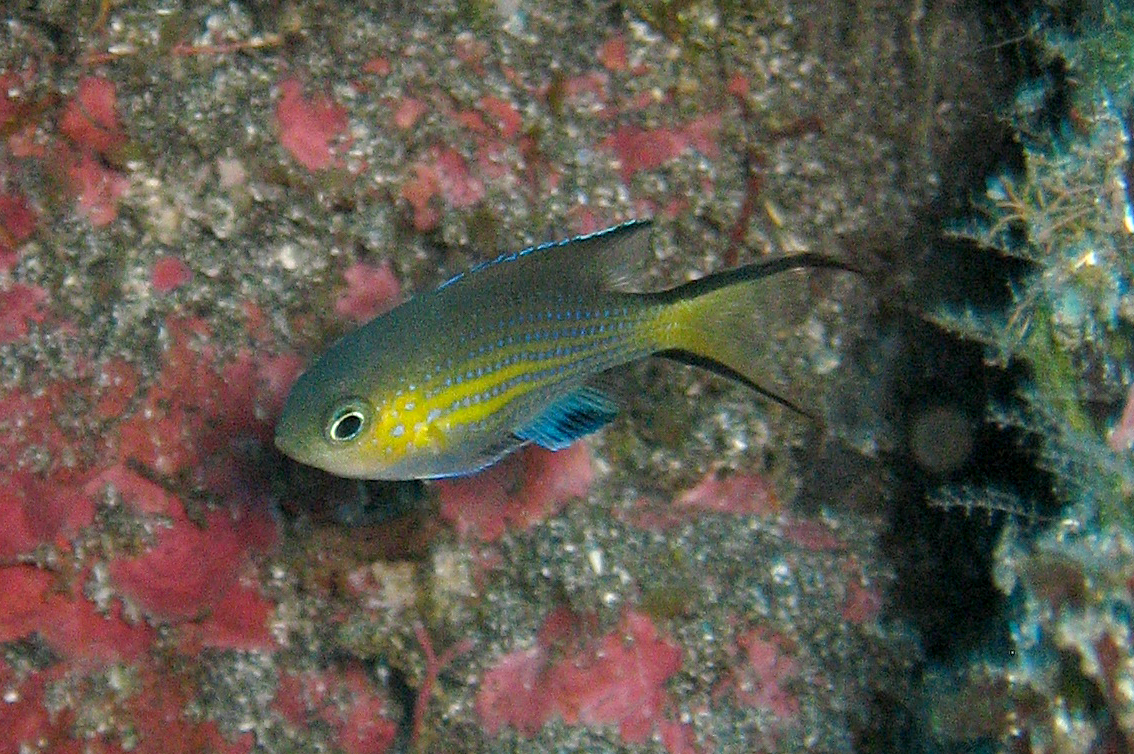Blacktail Chromis, Pycnochromis nigrurus (Smith 1960)
Other Names: Blueline Chromis, Yellow-tailed Puller

A Blacktail Chromis, Pycnochromis nigrurus, at Réunion Island, October 2011. Source: Matthieu Sontag / Wikimedia Commons. License: CC by Attribution-ShareAlike
Summary:
A greyish brown chromis with a yellowish cheek and lower side, rows of bluish spots forming faint blue stripes along the side, a bluish-black anal fin, and a yellow tail with or without a black streak along the upper and lower lobes.
This species was previously known as Chromis nigrura.
This species was previously known as Chromis nigrura.
Cite this page as:
Bray, D.J. 2023, Pycnochromis nigrurus in Fishes of Australia, accessed 02 Jul 2025, https://fishesofaustralia.net.au/home/species/4952
Blacktail Chromis, Pycnochromis nigrurus (Smith 1960)
More Info
|
Distribution |
Australian territories of Cocos (Keeling) Islands and Christmas Island in the eastern Indian Ocean. Elsewhere the species occurs in the east-Indo-west Pacific: East Africa and islands of the Western Indian Ocean, Maldives, Sri Lanka, east to Indonesia and Christmas Island. Individuals or small groups inhabit lagoons and outer reef slopes at depths to 30 m. |
|
Features |
Dorsal fin XII, 10-11; Anal fin II, 11; Pectoral fin 17; Lateral-line scales 15-16; Gill rakers 23-25. Body depth 1.7-1.8 in SL. |
|
Similar Species |
The similar Vanderbilt's Puller, Chromis vanderbilti, has a yellow upper caudal-fin lobe, a black lower lobe, and a broad yellow submarginal band on the dorsal fin. The Lined Puller, Chromis lineata, has a mostly yellow caudal fin, and a yellow spot at the rear base of the dorsal fin. |
|
Etymology |
The specific name is from the Latin nigro- (= black) and the Greek oura (= tail), in reference to the black upper and lower edges on the pale caudal fin. |
|
Species Citation |
Chromis nigrurus Smith 1960, Ichthyological Bulletin, Department of Ichthyology, Rhodes University, Grahamstown 19: 325. Type locality: Inhaca, Mozambique, western Indian Ocean. |
|
Author |
Bray, D.J. 2023 |
|
Resources |
Blacktail Chromis, Pycnochromis nigrurus (Smith 1960)
References
Allen, G. R. 1986. Family 219: Pomacentridae. pp. 670-682 in Smith, M.M. & Heemstra, P.C. (eds). Smith's Sea Fishes. Johannesburg : Macmillan South Africa xx + 1047 pp. 144 pls.
Allen, G.R. 1991. Damselfishes of the World. Melle, Germany : Mergus Verlag 271 pp.
Allen, G. R. 2001. Family Pomacentridae. pp. in Carpenter, K.E. & Niem, T.H. (eds). The Living Marine Resources of the Western Central Pacific. FAO Species Identification Guide for Fisheries Purposes. Rome : FAO Vol. 6 pp. 3381-4218.
Allen, G.R. 2022. Pycnochromis nigrurus. The IUCN Red List of Threatened Species 2022: e.T188529A1888403. https://dx.doi.org/10.2305/IUCN.UK.2022-2.RLTS.T188529A1888403.en. Accessed on 21 September 2023.
Allen, G.R. & Erdmann, M.V. 2012. Reef fishes of the East Indies. Perth : Tropical Reef Research 3 vols, 1260 pp.
Allen, G.R. & Smith-Vaniz, W.F. 1994. Fishes of Cocos (Keeling) Islands. Atoll Research Bulletin 412: 1-21
Allen, G.R. & Steene, R.C. 1988. Fishes of Christmas Island Indian Ocean. Christmas Island : Christmas Island Natural History Association 197 pp.
Allen, G.R., Steene, R.C. & Orchard, M. 2007. Fishes of Christmas Island.Christmas Island : Christmas Island Natural History Association 2 edn, 284 pp.
Hobbs, J-P.A., Newman, S.J., Mitsopoulos, G.E.A., Travers, M.J., Skepper, C.L., Gilligan, J.J., Allen, G.R., Choat, H.J. & Ayling, A.M. 2014. Checklist and new records of Christmas Island fishes: the influence of isolation, biogeography and habitat availability on species abundance and community composition. Raffles Bulletin of Zoology Supplement 30: 184–202
Hobbs, J-P.A., Newman, S .J., Mitsopoulos, G.E.A., Travers, M.J., Skepper, C.L., Gilligan, J.J., Allen, G.R., Choat, H.J. & Ayling, A.M. 2014. Fishes of the Cocos (Keeling) Islands: new records, community composition and biogeographic significance. Raffles Bulletin of Zoology Supplement 30: 203–219
Smith, J.L.B. 1960. Coral fishes of the family Pomacentridae from the western Indian Ocean and the Red Sea. Ichthyological Bulletin, Department of Ichthyology, Rhodes University, Grahamstown 19: 317-349 figs 1-6 pls 26-33 http://hdl.handle.net/10962/d1018780
Tang, K.L., Stiassny, M. L. J., Mayden, R.L. & DeSalle, R. 2021. Systematics of Damselfishes. Ichthyology & Herpetology 109(1): 258-318. https://doi.org/10.1643/i2020105





